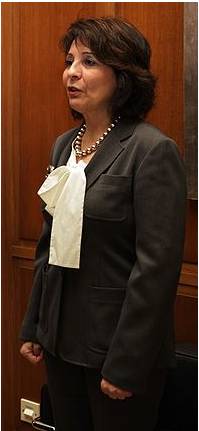Maria Damanaki
Maria Damanaki ( Greek Μαρία Δαμανάκη , born October 18, 1952 in Agios Nikolaos (Crete) ) is a Greek politician ( PASOK ). She was EU Commissioner for Maritime Affairs and Fisheries from 2010 to 2014 .
biography
Damanaki graduated from the National Technical University of Athens in Chemical Engineering in 1975. During her studies she was actively involved in the resistance against the Greek military dictatorship . During the student uprising in 1973 she was the voice of the radio station "Edo Politechnio". She was temporarily detained and tortured.
Political career
After the fall of the dictatorship, she was elected as the youngest member of the Greek parliament in 1977, to which she was a member until 1993, initially for the communist KKE and later for the Synaspismos . She had been chairman of Synaspismos since 1991, but resigned from the party chairmanship after the party failed in 1993 at the 3% hurdle. In 1994 she lost to the candidate of the Nea Dimokratia , Dimitris Avramopoulos, in the election of the Athens mayor as a candidate for a left-wing electoral alliance . From 2000 to 2003 she was a member of parliament again, but resigned from Synaspismos in 2003 and gave up her mandate. In 2004 she joined PASOK and was re-elected for it in the parliamentary elections in 2004 , 2007 and 2009 . From February 2010 to 2014 she was a member of the European Commission , where she was responsible for Fisheries and Maritime Affairs . She is currently Global Managing Director for Oceans at The Nature Conservancy.
Fisheries policy
Immediately after taking office, Damanaki transferred the previously influential EU official Cesar Deben, whom critics had accused of lobbying for Spanish deep-sea fishing. Damanaki announced that it would lower the catch quotas for all fish species so that they correspond to the recommendations of the International Council for the Exploration of the Sea (ICES) for sustainable use. This immediately met with resistance from representatives of the Spanish and German fishing industries and the respective ministries. In contrast, fisheries experts from several environmental organizations welcomed the new fisheries policy.
literature
- Maria Damanaki , in: Internationales Biographisches Archiv 16/2010 from April 20, 2010, in the Munzinger archive ( beginning of article freely available)
Web links
- CV on the website of Maria Damanaki (English)
Individual evidence
- ↑ J. Bittner et al. a .: Herring is a top priority. The time of April 28, 2011
| personal data | |
|---|---|
| SURNAME | Damanaki, Maria |
| ALTERNATIVE NAMES | Δαμανάκη, Μαρία (Greek) |
| BRIEF DESCRIPTION | Greek politician (PASOK) |
| DATE OF BIRTH | October 18, 1952 |
| PLACE OF BIRTH | Agios Nikolaos (Crete) |
